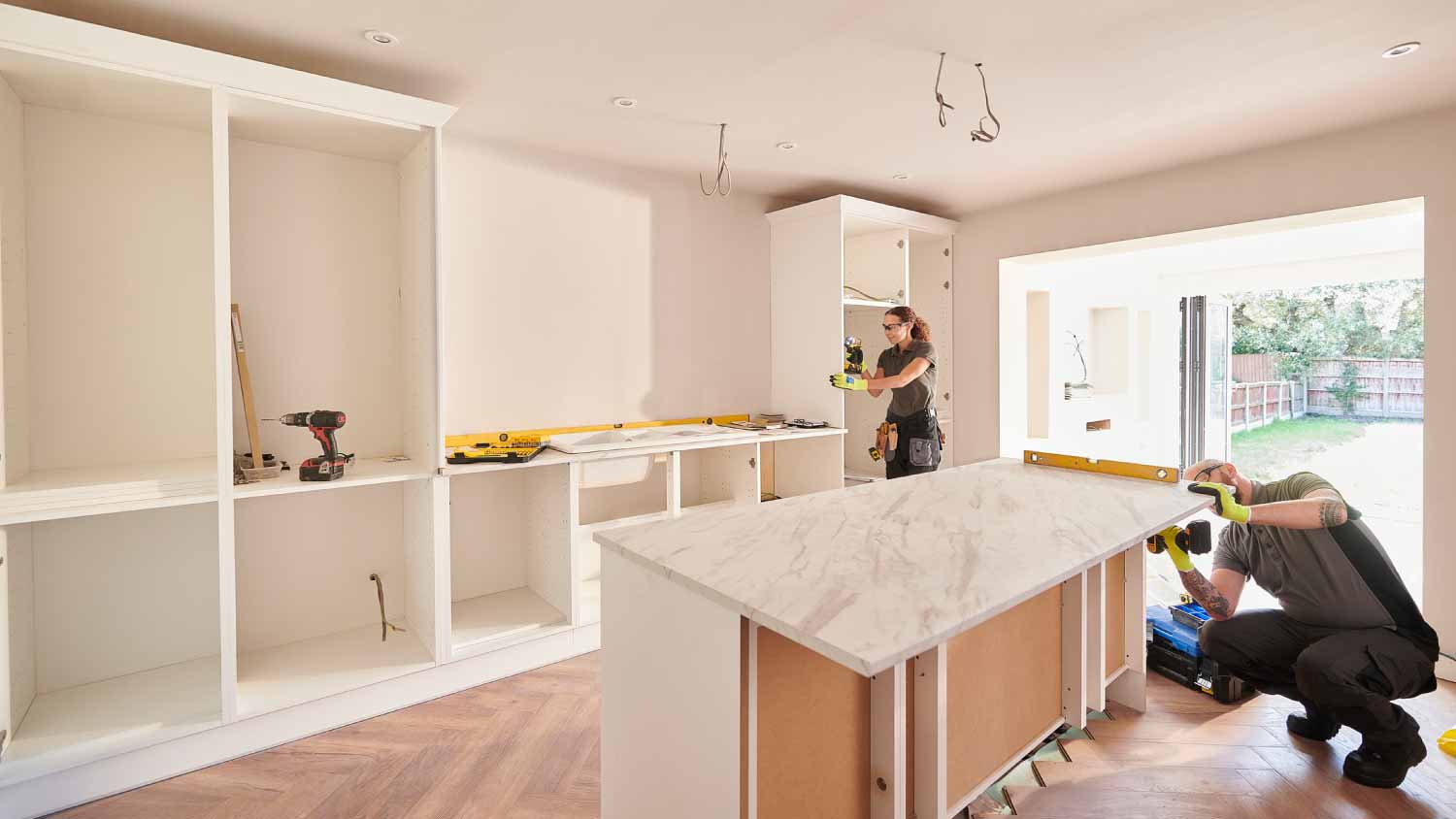
Discover the built in bookcase cost for 2025. Learn about price ranges, installation factors, and ways to save on your custom built in bookcase project.
Cabinet makers are artisans specializing in custom cabinetry


Custom cabinets are a significant investment that enhance the functionality and beauty of your home, and hiring the right professional is essential for ensuring quality craftsmanship. So, if you’re wondering who to hire to build custom cabinets, here are the pros to consider for a job done right.
A cabinet maker is a craftsman who designs, builds, and installs cabinets. Their work often extends beyond just cabinets to include various woodwork projects.
These pros specialize in high-end kitchen remodels with bespoke cabinetry. They have the necessary experience working with clients, designers, and architects to achieve specific design goals. The cost to install wood kitchen cabinets varies based on the size of your project and location.
The benefits of hiring a local cabinet maker include the following:
Capable of creating both stock and custom wood kitchen cabinets
Ability to create custom storage solutions for unique spaces
Possesses the required advanced skills and techniques to create intricate cabinetry designs
Ability to integrate specialized features like hidden compartments, wine racks, and custom shelving
Installing hinges demands precise layout to ensure that all doors align correctly across the cabinets. Consider making jigs for this stage. They can greatly simplify the process, ensuring consistency and alignment in every cabinet.

General contractors often have a network of skilled tradespeople, including custom cabinet makers, who can do the job. The advantage to hiring a general contractor near you is that they will manage your home project, from design to installation, ensuring great results. Contractors are an ideal choice if your renovation project extends beyond cabinetry to plumbing and electrical.
Hiring a skilled local carpenter with experience in cabinetry can be a route to go when building custom cabinets. They may not specialize exclusively in cabinets, but their broad woodworking skills can be valuable for customized projects. Remember that while many carpenters are skilled at building, not all may have the design expertise of a custom cabinetry maker.

Custom cabinet makers handle a cabinet project through well-defined steps to ensure quality and satisfaction. Here’s an overview of the process:
Consultation: The cabinet maker meets with the client to discuss their needs, preferences, and vision for the project, including style, materials, finishes, specific features, and measurements.
Quote: Afterward, they’ll create a detailed quote outlining the costs of the materials, labor, and additional services. Once the client approves the quote, they’ll sign a contract.
Design: The cabinet maker creates detailed designs and plans based on the client’s specifications. This process often involves using design software to create 3D renderings, which are then presented to the client for final approval.
Production: The cabinet components are precisely cut, shaped, and assembled in the workshop. This step requires meticulous attention to detail to ensure accuracy and quality. Afterward, they’ll sand, paint, or finish the cabinets according to the client’s specifications.
Installation: The cabinet maker or an installation team installs the cabinets, ensuring they fit perfectly and function correctly. The process includes adjusting doors, drawers, and hardware.
Custom cabinets cost between $2,800 and $12,980, or $500 to $1,200 per linear foot. Costs vary widely depending on the number of cabinets you need, their height, the complexity of the design, and the quality of the material you select. Get ready for a bill that could be two to three times higher if you choose an exotic wood, like cherry, rather than a medium-density fiberboard. You’ll also need to up your budget if you integrate add-ons, like cabinet Lazy Susans, wine racks, or pull-out spice racks.
Yes, with the right experience, you can DIY custom cabinets. However, it takes skill, time, and the right tools. You'll need to be comfortable with woodworking basics like measuring, cutting, and assembling, which can range from simple to pretty advanced. You'll also need to know your way around tools like saws, drills, sanders, and routers, plus have some clamps, measuring tools, and specialized joinery tools. If you’ve never done a complex building project like this before, leave this one to the pros.
From average costs to expert advice, get all the answers you need to get your job done.

Discover the built in bookcase cost for 2025. Learn about price ranges, installation factors, and ways to save on your custom built in bookcase project.

Is it time for new cabinet doors in your kitchen? Let’s explore the costs of new cabinet doors so you know exactly what to expect.

When refinishing your cabinets, you’ll need to consider the condition of your cabinets, budget, color, and stain preference. Find the cost to refinish cabinets in this guide.

Learn how to install kitchen cabinets like a professional to save money on your next remodel and take your DIY skills to the next level.

Cabinet drawers can run into a variety of issues from jamming to falling apart. Our guide covers how to fix a cabinet drawer with the best ways to deal with common problems.

Understanding the difference between custom and semi-custom cabinets will help you decide what’s the best fit for your budget, space, and design taste.